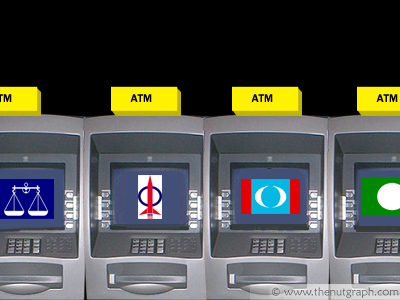 MEMBERS of Parliament (MPs) are also sometimes called legislators or lawmakers as they sit in the legislature and pass laws. But how far do Malaysian MPs play this role?
MEMBERS of Parliament (MPs) are also sometimes called legislators or lawmakers as they sit in the legislature and pass laws. But how far do Malaysian MPs play this role?
A majority of the 113 MPs who responded to The Nut Graph’s MP Watch: Eye on Parliament project recognised that one of their major roles was to be an effective lawmaker. However, many MPs complained about the lack of resources to fulfil this role. Many MPs also commented on Parliament’s limited role in actually formulating laws.
This begs the question: If MPs are not being enabled and entrusted in the fullest sense of the word to make the laws in Malaysia, who is? And what will it take for elected lawmakers to reclaim their rightful role?
Who makes law?
Currently, the Attorney General’s Chambers and relevant ministries draft most of the bills presented in Parliament. And according to some MPs, once these bills are presented to Parliament, they are hardly amended, no matter how lively the parliamentary debate on it may be.
“MPs are always referred to as lawmakers,” said Kota Raja MP Siti Mariah Mahmud from PAS. “But we are only debating and passing or voting against laws drafted by the government … We are never involved in drafting the laws or enactments unlike other parliaments. After all the debates, not a comma or a full stop will change.”
The DAP’s Tony Pua, who is also Petaling Jaya Utara MP, echoed this, saying Parliament had become a rubber stamp for the executive. He pointed out that even Barisan Nasional (BN) MPs were hampered by the system. Even when they raised good questions about a bill’s provisions, it did not necessarily result in any amendments.
So what needs to be done to give MPs more say in the lawmaking process? After all, what’s the point of having them sit in Parliament if they don’t significantly influence the drafting or amendment of legislation? What’s the purpose of MPs being the “people’s representatives” when in reality, the executive has all the say?
Lawyer Andrew Khoo, convener of Civil Society Initiatives for Parliamentary Reform, says MPs should have a much larger role in lawmaking than they currently do. “At the moment, Parliament appears to be a debating chamber to score political points, and generally doesn’t really change the course of legislation,” he tells The Nut Graph in a phone interview.
Process of lawmaking
Every bill passes through several stages before it can be approved. It goes through a first reading, when it is formally read out to Parliament. It is then tabled for second reading, when the bill is debated. It then goes through a committee stage, which should scrutinise the bill and propose any necessary amendments. After it passes the committee stage, the final version of the bill is debated and put to a vote after the third reading.

Khoo, however, says the committee review is “highly ineffective” in Malaysia because Parliament is “sorely lacking” in setting up select committees to go through bills in detail. In fact, many times, Parliament tends to have a committee of the whole House and rushes bills through.
“It’s possible to have the first and second reading on one day, and then go to the committee stage on the second day, with the third reading done at the end of that day. So legislation can be passed in just two days,” Khoo says.
Because bills are rushed through, there is little time for consultation. But having proper select committees would change that. These committees would theoretically be able to consult various parties, including those most affected by the bill, and independent experts. It would also allow MPs time to present the bill to their constituents to allow them to voice their feedback.
Insufficient resources
Even if lawmaking was made more democratic with the setting up of proper select committees, would MPs have enough resources to scrutinise bills in greater detail? Respondents to the MP Watch project painted a rather woeful picture when asked whether Parliament provided enough resources for them to perform their roles.
Many MPs seemed a rather harried lot, having to balance between reading stacks of material to participate in parliamentary debate and servicing large constituencies. Some, such as Parti Keadilan Rakyat (PKR) MP Johari Abdul (Sungai Petani), said they had no space to work in Parliament. Umno MP Datuk Abdul Rahman Dahlan (Kota Belud) echoed this, saying it was important for MPs to have offices where they could “do their work, have meetings and meet people”.
Umno MP Idris Haron (Tangga Batu) said perhaps MPs could have office cubicles and one permanent assistant. Rembau MP and Umno Youth chief Khairy Jamaluddin (Rembau) said Parliament needed a good resource centre with a comprehensive collection of magazines, journals and books, along with access to online research portals.
But the overwhelming request from MPs was for Parliament to bear the cost of research assistants to help them digest the voluminous information needed for them to be effective in their lawmaking.
Deputy Speaker Datuk Dr Wan Junaidi Tuanku Jaafar, who is also the Santubong MP, said Malaysian MPs are paid about RM10,000 a month, with a basic monthly salary of only about RM6,000. Of that income, MPs need to rent constituency service centres and pay staff to run the centres and a personal assistant, if they hire one. There is hardly any money left for MPs to engage research assistants on top of all their other expenses, as elucidated in the previous chapter.

Fuziah Salleh (Kuantan) said it was disappointing that Malaysia’s parliamentary research unit only had 16 research assistants to serve 222 MPs, compared to the 700 staff in the US Congress research unit that assists 200-plus Congress members.
Any improvement in MPs’ lawmaking role, such as by setting up more select committees, would therefore have to be accompanied by increased expenses to enable MPs to play that role effectively. Khoo says Parliament could make a start by setting up select committees and hiring research assistants for each committee. “The research assistant could conduct research with the results distributed to all the committee members,” he says.
Khoo says it would be worth the additional cost to allow MPs the resources to carry out their duties effectively. “It’s better to pay for the research to be done so that laws are made correctly, than pay for the mistake of making inadequate or inappropriate laws. There’s a cost involved there as well, but because we don’t monetise it, we don’t realise how big that cost is,” he points out.
Interestingly, all of the 18 MPs in MP Watch who said they had enough resources to carry out their roles as MPs were from Barisan Nasional (BN) component parties. Out of these 18, 12 were either current or former ministers or deputy ministers. This included former Housing and Local Government Minister Tan Sri Ong Ka Ting (Kulai), and former Tourism Minister Datuk Seri Tengku Adnan Tengku Mansor (Putrajaya).
Opposition disadvantage
Additionally, opposition MPs generally feel they are financially disadvantaged because they do not have access to the RM1 million-per-constituency fund from the Prime Minister’s special fund. The RM1 million allocation is meant for all MPs, but anecdotally has only been disbursed to BN MPs. Many, like Mohd Yusmadi Mohd Yusoff (Balik Pulau), said this allocation was clearly just for BN MPs as he had “not received a single sen”.

Opposition MPs also don’t have access to civil service support. “When a law is proposed, BN MPs get briefed on the legislation by civil servants,” says Khoo. “But civil servants aren’t allowed to brief opposition MPs. So opposition MPs have to go around asking non-governmental organisations or the Bar Council to brief them so they can understand the proposed legislation and give intelligent input during debates.”
The inequality of resources between government and opposition MPs is a cause for concern. Opposition MPs, after all, also represent a significant proportion of Malaysians. In fact, researchers say that in peninsular Malaysia, the BN narrowly lost the popular vote. Opposition MPs should therefore have equal resources and better access to the lawmaking process than is currently the case.
Some BN MPs also support better resources for all, including for the opposition. “MPs, regardless of party, should be allocated research assistants and a proper office in Parliament or somewhere near,” said Umno MP Saifuddin Abdullah (Temerloh). “This is the practice of many advanced democracies. This is so that the MP can really play a lawmaker’s role,” he added.
The MCA’s Teng Boon Soon (Tebrau) concurs on providing equal resources to opposition MPs. “If we only provide allowance for ruling party MPs, what about the interests of the people who disagree with the ruling party? They have the same rights and they deserve protection equally,” he said.
Far to go
Malaysian MPs seem woefully lacking in resources to conduct good research, unless backed up by party or government resources. Structures such as select committees that allow for greater scrutiny and public consultation are not in place. There is an imbalance in resources between opposition and government MPs. Like Thursday’s child in the nursery rhyme, it looks like the Malaysian Parliament has far to go towards playing a more effective and significant part in the lawmaking process. ![]()
This essay first appeared exclusively in Understanding the Dewan Rakyat, together with other analyses on how our government works. The book also contains the profiles of the current 222 MPs and how they and their parties would vote on key issues of democracy. The book is available at PusatLoyarBurok.

